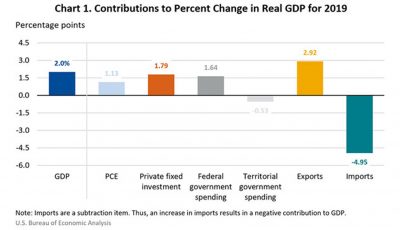BEA: Yutu caused GDP to dip 20%
Everyone knows that Super Typhoon Yutu left the CNMI economy in shambles, but no one really knew the extent of the damage—until now.
According to a report from the U.S. Bureau of Economic Analysis yesterday, the CNMI’s Gross Domestic Product in fiscal year 2018 dropped by nearly 20% from the previous fiscal year.
GDP is monetary measure of the market value of all the final goods and services produced in a specific time period, typically during a year.
The BEA report noted that the CNMI GDP fell to $1.323 billion in 2018, a 19.6% decrease from fiscal year 2017, which had a GDP of $1.6 billion, which was 25.1% higher over that of fiscal year 2016.
The BEA report noted that exports of services decreased 38.8% last fiscal year due to a decrease in visitor spending, including on casino gambling.
“Revenues from casino gambling dropped over 50%. The number of visitors to the CNMI decreased 21.5%, reflecting the effects of Super Typhoon Yutu, which made landfall on Saipan and Tinian on October 2018,” the report noted.
While private fixed investment decreased by 19.8% in the CNMI, reflecting a decline in business spending on construction and equipment, the report noted that business spending on construction and equipment remained at “historically high levels,” supported by continued development of the casino on Saipan, as well as post-Yutu repairs.
However, partly offsetting the declines in exports of services and private fixed investment was growth in government spending, specifically, federal government spending.
“Federal government spending more than doubled from the previous year, primarily due to recovery activities following [Super] Typhoon Yutu,” the report noted.
The CNMI GDP in fiscal year 2015 posted a 3.5% increase over the preceding fiscal year. In fiscal year 2016, that increased by 28.4% increase over that of fiscal year 2015, and further went up by 25.5% in fiscal year 2017 compared to 2016.
In a press conference yesterday at the Office of the Governor’s conference room on Capital Hill, Lt. Gov. Arnold I. Palacios said that Super Typhoon Yutu “was a significant attribute to the downward departure of our economy.”
The airport was closed down after Yutu’s devastation—a huge blow to the tourism industry in the CNMI, considering that that is the main source of the Commonwealth’s revenue.
“This basically created a shock to our community and the economy. We are rebounding in 2019, and we are very hopeful that things will look a lot different in the coming days and months,” Palacios said.
“Even though Yutu struck at the end of the year, the storm affected the overall number for 2018. Tourists stopped coming after the storm and this economic data reflects that negative impact,” he added.
Delegate Gregorio Kilili C. Sablan (Ind-MP) expects an even larger impact on the CNMI’s economic data in fiscal year 2019, but he still hopes that the inflow of federal aid would help mitigate the CNMI’s losses.
“Federal spending after Yutu helped to offset some of the losses from tourist dollars last year. It may be that the tens of millions of federal dollars spent this year in the recovery effort will also offset to some extent the continuing decline in tourism and other economic activity caused by the storm,” he said in a statement yesterday.
Sablan said yesterday that he will be meeting with BEA director Dr. Brian C. Moyer today to go over the report’s details.
“I am looking forward to getting the story behind the GDP headline number from Dr. Moyer,” Sablan said. “The information that BEA produces for the Marianas and the other U.S. insular areas is a key tool for policymakers both in Washington and here at home.”
“It also lets the public know whether our economy is headed in the right direction,” he added.
U.S. Congress provides the money that makes production of the annual economic data possible.




























